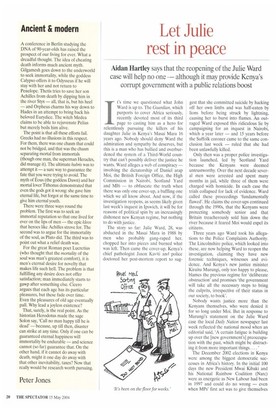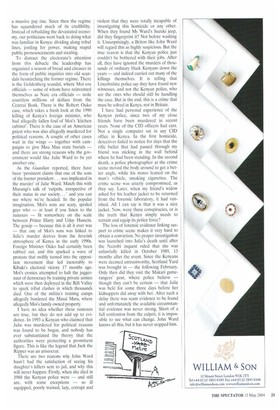Let Julie
rest in peace Aidan Hartley says that the reopening of the Julie Ward case will help no one — although it may provide Kenya's corrupt government with a public relations boost 1 t's time we questioned what John Ward is up to. The Guardian, which purports to cover Africa seriously, recently devoted most of its third page to casting him as a hero for relentlessly pursuing the killers of his daughter Julie in Kenya's Masai Mara 16 years ago. Nobody should deny Ward the admiration and sympathy he deserves, but this is a man who has bullied and overburdened the system of a Third-World country that can't possibly deliver the justice he wants. Ward alleges a web of conspiracy — involving the dictatorship of Daniel arap Moi, the British Foreign Office, the High Commission in Nairobi, Scotland Yard and MI6 — to obfuscate the truth when there was only one cover-up, a baffling one which we all know about. And now, if the investigation reopens, as seems likely given last week's inquest in Ipswich, it will be for reasons of political spin by an increasingly dishonest new Kenyan regime, but nothing to do with justice.
The story so far: Julie Ward, 28, was abducted in the Masai Mara in 1988 by men who probably gang-raped her, chopped her into pieces and burned what was left. Then came the cover-up. Kenya's chief pathologist Jason Kaviti and police doctored her post-mortem report to sug
gest that she committed suicide by hacking off her own limbs and was half-eaten by lions before being struck by lightning, causing her to burst into flames. An outraged Ward exposed this ridiculous lie by campaigning for an inquest in Nairobi, which a year later — and 15 years before the Suffolk coroner came to the same conclusion last week — ruled that she had been unlawfully killed.
Only then was a proper police investigation launched, led by Scotland Yard because the Kenyans were deemed untrustworthy. Over the next decade several men were arrested and spent many months in jail, while three of them were charged with homicide. In each case the trials collapsed for lack of evidence. Ward called these proceedings 'fundamentally flawed'. He claims the cover-ups continued through the 1990s, that the Kenyans were protecting somebody senior and that Britain treacherously sold him down the river because it feared Moi would expel its citizens.
Three years ago Ward took his allegations to the Police Complaints Authority. The Lincolnshire police, which looked into these, are now helping Ward to reopen the investigation, claiming they have new forensic techniques, witnesses and evidence. And Kenya's new justice minister Kiraitu Murungi, only too happy to please, blames the previous regime for 'deliberate obstruction' and promises 'the government will take all the necessary steps to bring the culprits, irrespective of their status in our society, to book'.
Nobody wants justice more than the Kenyans themselves, who were denied it for so long under Moi. But in response to Murungi's statement on the Julie Ward case the local Daily Nation newspaper last week reflected the national mood when an editorial said, 'A certain fatigue is building up over the [new government's] preoccupation with the past, which might be distracting it from more important things.
The December 2002 elections in Kenya were among the biggest democratic successes in Africa's history. In the initial 100 days the new President Mwai Kibalci and his National Rainbow Coalition (Narc) were as energetic as New Labour had been in 1997 and could do no wrong — even when MPs' first act was to give themselves a massive pay rise. Since then the regime has squandered much of its credibility. Instead of rebuilding the devastated economy, our politicians went back to doing what was familiar in Kenya: dividing along tribal lines, jostling for power, making stupid public pronouncements and stealing.
To distract the electorate's attention from this debacle the leadership has organised a season of bread and circuses in the form of public inquiries into old scandals besmirching the former regime. There is the Goldenberg scandal, where Moi era officials — some of whom have reinvented themselves as Narc era officials — stole countless millions of dollars from the Central Bank. There is the Robert Ouko case, which takes a fresh look at the 1990 killing of Kenya's foreign minister, who had allegedly fallen foul of Moi's 'kitchen cabinet'. There is the case of an American priest who was also allegedly murdered for political reasons. A couple of other cases wait in the wings — together with cam paigns to give Mau Mau state burials — and there are strong reasons why the government would like Julie Ward to be yet another one.
As the Guardian reported, there have been 'persistent claims that one of the sons
of the former president. . . was implicated in the murder' of Julie Ward. Match this with Murungi's talk of 'culprits, irrespective of their status in our society...' and you can see where we're headed. In the popular imagination, Moi's sons are scary, spoiled guys who — at least if you listen to the rumours — fit somewhere on the scale between Prince Harty and Uday Hussein.
The gossip — because this is all it ever was — that one of Moi's sons was linked to Julie's murder derives from the feverish atmosphere of Kenya in the early 1990s.
Foreign Minister Ouko had certainly been rubbed out, and this sparked a wave of protests that swiftly turned into the opposi tion movement that led inexorably to Kibaki's electoral victory 17 months ago.
Moi's cronies attempted to halt the jugger naut of democracy by training private armies which were then deployed in the Rift Valley to spark tribal clashes in which thousands died. One of the militia's training camps allegedly bordered the Masai Mara, where allegedly Moi's family owned property.
I have no idea whether these rumours are true, but they do not add up to evi dence. In 1993 a Kenyan who claimed that Julie was murdered for political reasons was found to be bogus, and nobody has ever substantiated the theory that the authorities were protecting a prominent figure. This is like the legend that Jack the Ripper was an aristocrat.
There are two reasons why John Ward hasn't had the satisfaction of seeing his daughter's killers sent to jail, and why this will never happen. Firstly, when she died in 1988 the Kenyan police were — and still are, with some exceptions — so ill equipped, poorly trained, lazy, corrupt and violent that they were totally incapable of investigating this homicide or any other. When they found Ms Ward's Suzuki jeep, did they fingerprint it? Not before washing it. Unsurprisingly, a Briton like John Ward will regard this as highly suspicious. But the true reason is that the Kenyan police just couldn't be bothered with their jobs. After all, they have ignored the murders of thousands of ordinary black Kenyans down the years — and indeed carried out many of the killings themselves. It is telling that Lincolnshire police say they have found new witnesses, and not the Kenyan police, who are the ones who should still be handling the case. But in the end, this is a crime that must be solved in Kenya, not in Britain.
I have had personal experience of the Kenyan police, since two of my close friends have been murdered in recent years. None of the CID officers had cars. Not a single computer sat in any CID office in Kenya. In the first homicide, detectives failed to notice for days that the rifle bullet that had passed through my friend was sticking in the wall behind where he had been standing. In the second death, a police photographer at the crime scene moved the body around to get a better angle, while his mates leaned on the man's vehicle, smoking cigarettes. The crime scene was utterly compromised, as they say. Later, when my friend's widow asked for his leather jacket to be returned from the forensic laboratory, it had vanished. All I can say is that it was a nice jacket. Now, were these conspiracies, or is the truth that Kenya simply needs to retrain and equip its police force?
The loss of forensic evidence linking suspect to crime scene makes it very hard to obtain a conviction. No proper investigation was launched into Julie's death until after the Nairobi inquest ruled that she was unlawfully killed in October 1989, 13 months after the event. Since the Kenyans were deemed untrustworthy, Scotland Yard was brought in — the following February. Only then did they visit the Makari gamerangers' post, where police believe — though they can't be certain — that Julie was held for some three days before her kidnappers did away with her. After such a delay there was scant evidence to be found and unfortunately the available circumstantial evidence was never strong. Short of a full confession from the culprit, it is impossible to see what can change. John Ward knows all this, but it has never stopped him.



































































































 Previous page
Previous page